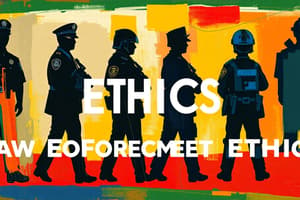Podcast
Questions and Answers
What is the requirement for off-duty officers regarding arrests in personal quarrels?
What is the requirement for off-duty officers regarding arrests in personal quarrels?
- They can make arrests in personal quarrels to maintain order
- They should not make arrests in quarrels unless it is necessary to prevent bodily injury or death (correct)
- They are prohibited from making any arrests in personal quarrels
- They must immediately intervene in any personal quarrel
What must a member do if they are arrested for a state criminal offense?
What must a member do if they are arrested for a state criminal offense?
- Provide minimal information to the Office of the Chief of Police
- Notify the Office of the Chief of Police with all details of the incident (correct)
- Keep the arrest a secret to avoid repercussions
- Consult with a personal attorney before notifying anyone
Under what circumstances are members prohibited from engaging in sexual conduct?
Under what circumstances are members prohibited from engaging in sexual conduct?
- While officially representing the department and using their position in any capacity
- While on-duty, in uniform, working off-duty, officially representing the department, in a mentoring capacity, and using their position (correct)
- While working off-duty and in a mentoring capacity only
- While on-duty and in uniform only
What is the responsibility of off-duty officers regarding nonemergency situations?
What is the responsibility of off-duty officers regarding nonemergency situations?
What authority do off-duty officers have outside the city limits?
What authority do off-duty officers have outside the city limits?
Flashcards
Off-duty arrests in personal quarrels?
Off-duty arrests in personal quarrels?
They should not make arrests in quarrels unless it is necessary to prevent bodily injury or death.
Arrested for a state criminal offense?
Arrested for a state criminal offense?
Notify the Office of the Chief of Police with all details of the incident.
Prohibited sexual conduct?
Prohibited sexual conduct?
While on-duty, in uniform, working off-duty, officially representing the department, in a mentoring capacity, and using their position.
Off-duty nonemergency situations?
Off-duty nonemergency situations?
Signup and view all the flashcards
Off-duty authority outside city limits?
Off-duty authority outside city limits?
Signup and view all the flashcards
Study Notes
- Supervisory officers are responsible for enforcing departmental rules and regulations.
- They must maintain accurate books, records, and reports.
- Supervisory officers must be fair and impartial in enforcing rules.
- They are expected to stay informed about the activities under their command.
- Supervisory officers are required to document all inspections and briefings.
- They must coordinate activities with other units and divisions.
- Supervisors shall have updated employee locator lists and check all changes with personnel.
- Members must abide by laws, ordinances, and departmental orders.
- Members must speak the truth and ensure reports reflect truth.
- Members must obey lawful orders and must report unlawful or unjust orders.
- Members shall serve the public with impartiality and respect.
- Members shall maintain good physical and mental health.
- Members shall not become physically or mentally dependent on alcohol or controlled substances unless for official duties or under a physician's direction.
- Members shall respect and cooperate with each other and their supervisors.
- Members must maintain proper discipline and not criticize or defame the department.
- Members shall not interfere with the effectiveness of the department or undermine its integrity.
Studying That Suits You
Use AI to generate personalized quizzes and flashcards to suit your learning preferences.




